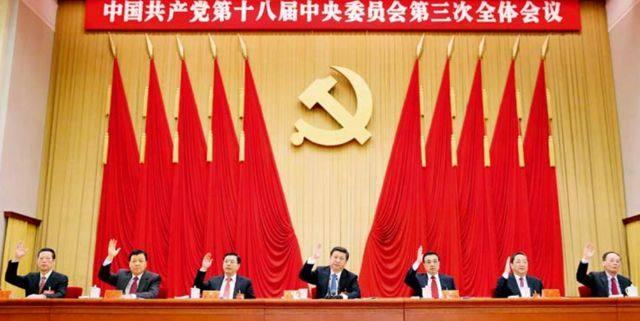Diving Deep into Reform
2013-04-29byZiMo
by Zi Mo
Early in November 2013, the Third Plenary Session of the 18th Central Committee of the Communist Party of China (CPC), which was heralded as a “crucial meeting worth anticipating” by some foreign media outlets, convened in Beijing, marking the dawn of the countrys new historic era of deeper, more comprehensive reform.
Reform Roadmap for the Next Decade
The Third Plenary Session of the 11th CPC Central Committee held in 1978 ignited the pilot light of reform and opening-up, which ultimately spread across the country. Since then, the Chinese people have witnessed tremendous changes in their lives. Over the past 35 years, Chinas GDP has multiplied 142 times, average urban income has increased 71 times, and the country has returned to the center of the world stage. However, as China entered the “deep water” of reform, some problems such as the need to reform economic and social structures, regional imbalance, and entanglements between roles of government and the market have emerged, spurring the nation to deepen its reform comprehensively.
The Decision on Major Issues Con- cerning Comprehensively Deepening Reforms passed at the Third Plenary Session of the 18th CPC Central Committee is considered the “manifesto” of Chinas deeper reform, becoming a “top-level designed” blueprint for reform across various fields such as economy, society, culture, and ecology in the coming decade.
Reform of the economic system re- mains the key focus of Chinas overall reform plan. The communiqué released after the Third Plenary Session of the 18th CPC Central Committee acknowledges that China will deepen its economic reform to ensure that the market plays a “decisive”role in allocating resources, which has inspired considerable concern. The markets role had been defined as “basic” in allocating resources when the country decided to build a socialist market economy two decades ago.
“This [the change] indicates that China will let the market play a heavier role in guiding the economy than the government,”remarks Zhang Zhuoyuan, a research fellow at the Chinese Academy of Social Sciences. He explains that the reason Chinese policymakers emphasized the “decisive” role of the market is due to the fact that the government has sometimes interfered too much in resource allocation and microeconomy. He adds that China will deepen market-oriented reform more comprehensively.
According to Ding Shuang, a senior economist with Citigroup Inc., letting the market play a “decisive” role in resource allocation means that the Chinese government wants to curb economic intervention, and this is also a signal that the government will further encourage private capitals role in the market.
For ordinary people, the highlight of the Third Plenary Session of the 18th CPC Central Committee was the keynote address, which outlined reform directly impacting peoples livelihood. The Decision points out that social reform must evolve around the protection and improvement of the peoples livelihood and advance fairness and justice, and that the country will promote common prosperity through income distribution system reform and ensure equal access to basic public services through accelerating social system innovation.
The existing urban-rural dual structure has long been a major obstacle hindering Chinas integrated development. According to the Decision, farmers will be given greater property rights, and China will promote more balanced allocation of public resources between urban and rural areas and build a healthy system for urbanization. Such measures will accelerate market access of rural labor, land, and capital, as well as agricultural products.
Professor Zhu Lijia of the Chinese Academy of Governance notes that peoples livelihood is one crucial piece of the countrys overall reform, which necessitates reform of the pension system, household registration system, and medical care system. It is predicted that economic and social reform will enhance fairness in public resource allocation and substantively improve living standards.
According to communiqué of the Session, China will create a central pilot team to “comprehensively deepen reform”as well as a state security committee. The pilot team will be in charge of designing overall reform, arranging and coordinating reform, pushing forward reform as a whole, and supervising the implementation of reform plans. The pending establishment of the state security committee implies that the country will address issues concerning national security from a comprehensive perspective.
Global Ripples
The reform roadmap passed at the Third Plenary Session of the 18th CPC Central Committee will unleash Chinas economic potential and promote healthier economic growth. Chinas reform will also benefit the world and inject vitality into the sustainable development of the global economy.
Just as U.S.-based Contra Costa Times comments, “Many of the changes are likely to be internal, but Chinas sheer size and importance to the world ensure that even internal reform can create worldwide ripples.”
Cheng Li, a renowned expert on China Studies at the Brookings Institute, believes that Chinas reform measures will push the emerging middle class to play an important role in investment and consumption. “The entire world will benefit from Chinas economic transformation and its 2.0 version of reform,”he remarks. “China has become the worlds largest consumption market for the middle class, and its size is continuing to grow.”
The Session also calls for widened investment access, accelerated construction of free trade zones, and further opening of inland and border areas. China (Shanghai) Pilot Free Trade Zone, launched at the end of September 2013, has been dubbed a“new test field for Chinas economic reform and opening,” and evidences Chinas further opening. “Each step that China takes toward reform makes it easier for other countries to cooperate with China,” comments Warren McFarlan, a retired professor from Harvard Business School.
Along with substantive opportunities and benefits, the array of new reforms unveiled at the Session has also inspired other countries to incubate their own reform plans. “Over the past decades, China has achieved tremendous success,” notes Nicolas Berggruen, an American investor and founder of Berggruen Institute on Governance. “The reason is that it continues reforming to adapt to each change in situation.”
